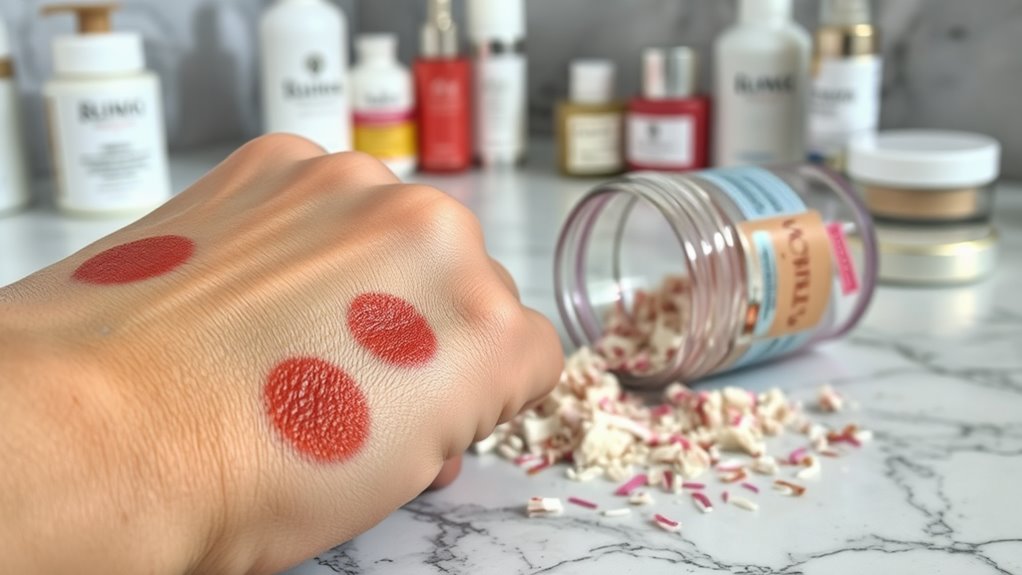Exfoliating Mistakes That Are Damaging Your Skin
Over-exfoliating, using harsh chemical ingredients, and ignoring your skin type can seriously damage your skin. Excessive scrubbing strips natural oils, leading to irritation and a weakened barrier. Harsh acids can cause long-term sensitivity and redness. Furthermore, skipping moisturizer after exfoliation leaves your skin vulnerable and increases dryness. Don’t forget sunscreen, as freshly exfoliated skin is more prone to UV damage. Understanding these mistakes is vital for healthy skin. You’ll discover essential tips to elevate your exfoliation routine.
Over-Exfoliating: The Dangers of Excessive Scrubbing
How often do you exfoliate your skin? If you’re scrubbing too frequently, you might be making critical exfoliating errors.
Over-exfoliating can strip your skin of its natural oils, leading to irritation, redness, and even breakouts.
The skin’s barrier weakens, making it more vulnerable to environmental stressors.
Research shows that exfoliating more than twice a week can disrupt your skin’s microbiome, essential for overall health.
Listen to your skin; if it feels sensitive or looks dull, cut back on scrubs and peels.
In addition, recognizing over-exfoliation can help you adjust your routine before serious damage occurs.
Using Harsh Ingredients: The Impact of Chemical Exfoliants
Have you ever considered the ingredients in your chemical exfoliants?
Many popular products contain potent acids like alpha-hydroxy acids (AHAs) and beta-hydroxy acids (BHAs) that can effectively slough off dead skin.
However, using high concentrations or harsh formulations can disrupt your skin’s natural barrier, leading to irritation, redness, and even breakouts.
Studies show that overuse of these aggressive ingredients can cause long-term damage, including increased sensitivity and premature aging.
Always read labels and opt for gentle formulations that suit your skin’s needs, ensuring you achieve a healthy glow without compromising your skin’s integrity. Additionally, it is crucial to choose the right exfoliator for your skin type, as this can significantly impact how your skin reacts to these exfoliating agents.
Ignoring Skin Type: Customizing Your Exfoliation Routine
Understanding your skin type is essential when selecting an exfoliation routine. If you have sensitive skin, opt for gentle exfoliants like lactic acid or enzyme-based products to avoid irritation. Oily skin benefits from chemical exfoliants, such as salicylic acid, which can help unclog pores. For dry skin, consider milder options and focus on hydrating ingredients. Normal or combination skin may tolerate a mix of both physical and chemical exfoliants. Tailoring your routine to your skin type guarantees best results and prevents damage. Always patch-test new products to gauge your skin’s response before fully incorporating them into your regimen. Additionally, knowing the common signs of misdiagnosis can help you avoid inappropriate products that may exacerbate your skin issues.
Skipping Moisturizer: The Importance of Hydration After Exfoliation
Why is it essential to apply moisturizer after exfoliating?
Exfoliation removes dead skin cells, revealing fresh skin underneath, but it can also strip away natural oils. This leaves your skin vulnerable to dryness and irritation. By applying a moisturizer immediately after exfoliation, you help restore hydration and create a protective barrier. Research shows that well-hydrated skin improves its resilience and overall appearance. Moreover, skipping this crucial step can lead to compromised barrier function and increased sensitivity, which defeats the purpose of exfoliating in the first place. Choose a lightweight, non-comedogenic moisturizer to prevent clogging pores. Remember, prioritizing hydration is key for healthier skin.
Not Following up With Sunscreen: Protecting Your Skin Post-Exfoliation
Although exfoliation can greatly enhance your skin’s texture and appearance, it also makes your skin more susceptible to UV damage.
After exfoliating, your skin’s protective barrier may be compromised, increasing the risk of sunburn and long-term damage.
To safeguard your skin, always apply a broad-spectrum sunscreen with at least SPF 30. This shields your freshly exfoliated skin from harmful UV rays that can lead to premature aging, pigmentation, and even skin cancer.
Additionally, choosing a sunscreen with proper application techniques can further enhance its effectiveness.
Remember to reapply every two hours, especially if you’re outdoors.
Prioritizing sunscreen is an essential step in your skincare routine, ensuring lasting benefits from your exfoliation efforts.

